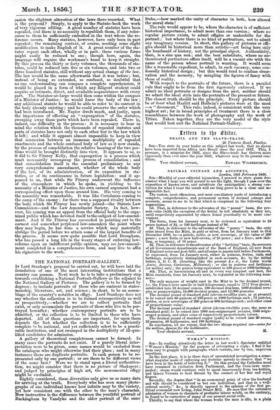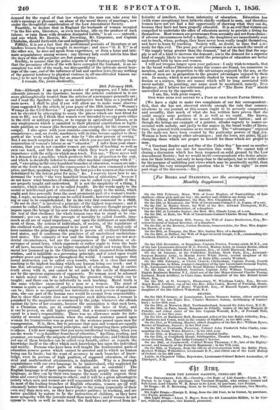WOMAN'S MISSION.
San—In reading attentively the letter in last week's Spectator entitled "Woman's Mission," for the purpose of attempting a reply, I find it far from easy to grapple with paragraphs which contain, one by one, unproven assertions.
In the first place, it is in these days of unrestricted investigation a some- what singular mode of enforcing any doctrine merely to observe that "we have been in the habit of believing it." On this ground the Catholics must have remained in exclusion from Parliament, and the Corn-laws until- pealed; steam would continue only to spout innocuously from tea-kettles, and Queen Victoria to heal disease by the contact of her fair and royal fingers.
Secondly, the dogma that "in an eoanomical point of view the husband and wife should be considered as but one individual, and that in a well. ordered society," he., is directly opposed to the opinion of the first po- litical economist now living, John Stuart Mill. He says that the extensive admission of women to channels of profitable labour would, on the contrary, be found to be corrective of many of our present social evils. Thirdly, to say that where the woman works the man is idle, is a plain
demand for the repeal of that law whereby the man can take away his wife's earnings at pleasure ; an abuse of the moral theory of marriage, now under the thoughtful consideration of the Law Amendment Society.
Fourthly, to declare that in England the husbands of women occupied "in the fine arts, literature, or even teaching' idle on the produce of such labour, or ruin them with drunken dissipated habits," is an — untruth ; and one which Mr. Hewitt,. Mr. Browning, Mr. Carpenter, and Captain Chisholm, should forthwith rise and indignantly deny. Fifthly, it is not a fact that the professional pursuits of literature or art hinders women from being sought in marriage ; and since "G. E. T." is of the other sex, he does not speak from experience, or from a large and inti- mate acquaintance among women : any literary lady could inform him that the days of this old prejudice are fast passing away.
Sixthly, to assume that the police reports of wife-beating generally imply that the pecuniary efforts of the wife have corrupted the husband, is an as- sumption too wide of the mark, too disregardful of the intricate moral bear- ings of the case, and of the influence of bad and careless laws,(to say nothing of the general tendency to physical violence in all uncultivated human na- ture,) to be met by anything but an amazed silence. I remain, Sir, yours obediently, B.



































 Previous page
Previous page